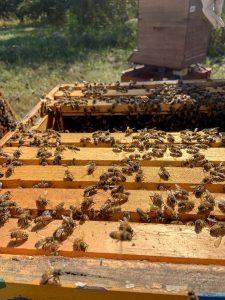
What does it take to truly save the dwindling bee population?
The decline of bees isn’t new news. We’ve seen the stories surface in the media about the impact agricultural processes and pesticides are having on bees. We’ve watched startup companies form with the hope of rebuilding the bee population. And yet, bees globally are still experiencing a major decline.
Protecting the health of bees requires more than beekeepers can do on their own. Beekeepers are fully aware of their own hives and their bees’ health but don’t have knowledge of bee health in the larger environment. That’s where citizen scientists and the general population can make the difference.
To understand the health of today’s bee population and slow the decline, we first have to identify the bees that surround us. We need to “count” the bees to be able to save them – and counting the world's bee population is the first step in protecting their future globally. The data collected from our bee count provides the information needed about where species of bees reside and how prevalent bees are in those areas. SAS is partnering with Appalachian State University to do just that.
Technology is vital to saving the bees
We can no longer rely solely on traditional methods to protect these pollinators and their environments. Instead, technology must be employed. Data collection is the first step, but visualizing that data is what offers beekeepers and researchers alike the earliest indicators of looming threats. Those indicators are the key to equipping decision makers in the bee community with insights they never thought possible before.
To gather the data needed to enable that technology, we need everyone’s help. Through the World Bee Count and its app, citizens can help count the bees and submit images of them in their environment.
“The World Bee Count allows us to crowdsource bee data to both visualize our planet’s bee population and create one of the largest, most informative data sets about bees to date,” said Joseph Cazier, Professor and Executive Director at Appalachian’s Center for Analytics Research and Education.
SAS is dedicated to solving the world’s most pressing problems – and saving the bees is one problem we can’t ignore. With our existing work on analytics to promote bee health and our passion for using Data for Good, this partnership reflects the heart of SAS – our curiosity and pursuit to solve global issues.
Analytics for everyone
SAS created the Global Pollinator Map – a visualization of the crowdsourced data coming from citizen scientists and beekeepers “counting bees” via the World Bee Count app. In later phases of the project, researchers will overlay key data points like crop yield, precipitation and other contributing factors of bee health, gathering a more comprehensive understanding of our world’s most important pollinator.
The visualization will enable analytics by creating a rich data set that others can add to and from which correlations can be drawn. What started as a simple visualization of bee data will offer endless opportunities to research bee populations, the factors leading to their decline, and how we can promote overall bee health going forward.
Download the app and get involved
Adding images to the app is a small but important part that you can play in saving the bees. Bees give us a colorful breakfast table, provide that wonderful natural sweetener in honey, and keep us healthy and moving forward. Celebrate World Bee Day this May 20th by downloading the app from beescount.org and count the bees you see. Continue counting throughout the month of June and beyond, because – bees count!
